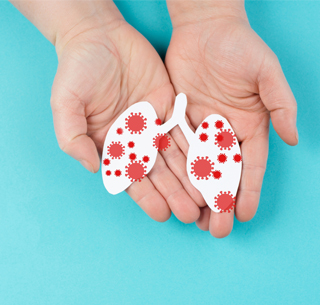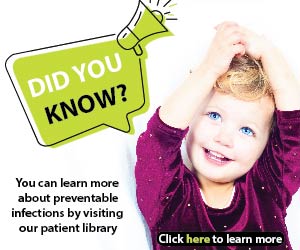RSV: New protection against an old illness

As we move toward fall and the season of coughs and sniffles, healthcare providers are bracing for an uptick in viral infections. Along with seasonal colds and flu, comes respiratory syncytial virus, or RSV, a respiratory tract infection that typically affects young children and older adults.1
And like last fall, we’re expecting a resurgence in COVID-19 cases as more people gather indoors – raising concerns that another tripledemic of influenza, COVID-19, as well as RSV will put Canadians – especially younger and older patients – at risk of serious illness.2
The highly contagious RSV virus – first described in the mid-1950s2 – is the leading cause of lower respiratory tract illness in young children in Canada and countries around the world; in fact, as physicians know all too well, most children will develop RSV by the age of 2.1
RSV typically causes mild cold-like symptoms such as a runny nose, coughing, sneezing, and fever that resolve on their own in a week or two. However, severe RSV can cause lower respiratory tract infection, bronchiolitis, and pneumonia, making it one of the leading causes of hospitalization of infants under age 2.1
Older people also at risk of RSV
“There’s a huge burden of RSV illness that occurs annually among older adults during cold and flu season and it is a significant cause of hospitalizations and death within this population as well,” Dr. Samir Sinha, director of geriatrics at Sinai Health and University Health Network hospitals in Toronto, told Global News last fall.3
In the United States (US), a 4-year study found that annual rates of RSV infection were 3 - 7% in healthy elderly patients and 4 – 10% among high-risk adults.4
In the United Kingdom (UK) between 1995 and 2009, older adults accounted for 79% of hospitalizations for RSV and 93% of deaths from RSV, according to one study.5
Detecting infection
RSV is usually a clinical diagnosis. However, since the recent spike in RSV infections in some parts of the Southeastern United States, the CDC has advised clinicians to consider testing symptomatic patients with high-risk conditions for COVID-19, influenza, and RSV to inform treatment decisions.6
Reducing the risk of severe RSV
Until recently, there has been no vaccine to protect people at high risk against RSV. High-risk infants may be given monthly injections of the antibody palivizumab (SynagisTM) to temporarily reduce their risk of developing severe RSV infection.7
A new antibody medication, nirsevimab (Beyfortus) developed by AstraZeneca and Sanofi, was recently authorized for use in newborns and infants during their first RSV season, to help reduce their risk of developing serious lower respiratory tract disease due to RSV infection.8
Pending recommendations of Canadian Agency for Drugs and Technologies in Health (CADTH), Health Canada expects the antibody “will be available for limited use during the 2023/2024 fall/winter respiratory season," the CBC reported. One dose of nirsevimab is expected to last for an entire RSV season.8
First RSV vaccine gets Health Canada approval for use in older adults
On August 4 of this year, Health Canada approved the world’s first RSV vaccine - GSK's Arexvy - for prevention of lower respiratory tract disease (LRTD) caused by RSV in individuals 60 years of age and older.9
And an RSV vaccine made by Pfizer, known as RSVpreF, is currently being reviewed by Health Canada for use both in adults age 60 and older, and for maternal immunization during pregnancy, to pass protection from the parent to the newborn.10
Offer your patients 3 vaccines in one visit this fall!
“Combination vaccines are a very important development in the treatment of respiratory viruses, particularly in older adults, because they increase the likelihood of people getting their recommended shots every year. It’s a lot to ask people to get three separate shots for RSV, SARS-Cov-2, and flu every year.”11
Stefania Maggi, MD, MPH, PhD: University of Padua11
Brought to you by Vaccines411.ca - know where to go for your vaccinations.
This information should not be used as a substitute for the medical care and advice of your doctor. There may be variations in treatment that your physician may recommend based on individual facts and circumstances.
Read more Vaccines411® Articles 
Sources
Note: the hyperlinks that direct to other sites are not continuously updated. It is possible that some links become untraceable over time. Thank you.
- Respiratory syncytial virus (RSV): For health professionals
https://www.canada.ca/en/public-health/services/diseases/respiratory-syncytial-virus-rsv/health-professionals.html - Canadian doctors brace for another ‘tripledemic’ – COVID-19, RSV and influenza
https://globalnews.ca/news/9923460/tripledemic-canada-fall-influenza-rsv-covid/ - RSV not just a kids problem, doctors warn as infections surge in Canada
https://globalnews.ca/news/9299674/rsv-adults-canada-symptoms/ - Respiratory syncytial virus infection in elderly and high-risk adults
https://pubmed.ncbi.nlm.nih.gov/15858184/ - Modelling estimates of the burden of Respiratory Syncytial virus infection in adults and the elderly in the United Kingdom
https://www.ncbi.nlm.nih.gov/pmc/articles/PMC4618996/ - Increased Respiratory Syncytial Virus (RSV) Activity in Parts of the Southeastern United States: New Prevention Tools Available to Protect Patients
https://emergency.cdc.gov/han/2023/han00498.asp - RSV Immunizations Are Coming. This U of T Researcher Is Helping Parents Prepare
https://www.dlsph.utoronto.ca/2023/07/05/rsv-vaccine-canada-infant-pregnant-people/ - Drug to help prevent serious RSV illness in babies approved by Health Canada
https://www.cbc.ca/news/health/rsv-antibody-drug-babies-1.6820907 - Health Canada approves 1st RSV vaccine for people 60 and older
https://www.cbc.ca/news/health/rsv-health-canada-vaccine-1.6928175 - First RSV vaccine approved in U.S. after decades of attempts
https://www.cbc.ca/news/health/first-rsv-vaccine-approved-in-u-s-after-decades-of-attempts-1.6831129 - RSV in Older Adults: The Promise of New Vaccine Technology
https://www.medscape.org/viewarticle/992400



